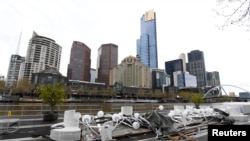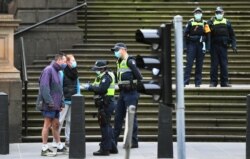A judicial inquiry in Australia continues to probe failures in the nation’s COVID-19 hotel quarantine system for returning travelers. The inquiry has heard that security breaches almost certainly sparked a deadly second wave of infections in the state of Victoria, which is at the center of Australia’s coronavirus crisis.
Foreign nationals were banned from Australia when its international borders were closed in March. But many thousands of citizens and permanent residents have been allowed to fly home, where they face a mandatory 14-days in hotel quarantine.
In Victoria, Australia’s second-most populous state, the system has been chaotic. Members of a judicial inquiry heard that breaches in security at two hotels allowed infected passengers to spread the disease into the community, causing a second wave of COVID-19.
Instead of using soldiers to secure the hotels like in other parts of the country, Victoria used private security guards. Many allegedly were poorly-trained and ill-equipped.
Victoria’s emergency management commissioner, Andrew Crisp, has told the investigating panel he thought private companies could do the job.
“I guess in terms of a view I thought they would have been a suitable and appropriate workforce to use in the hotel. I have worked a lot with private security and the thinking was that well-trained, well-supervised private security in this type of role would have been efficient and effective,” he said.
They weren’t. The hotel quarantine fiasco in Victoria is considered by many to be Australia’s greatest failure in the pandemic, so far. Senior government, police and health officials, including state premier Daniel Andrews, are scheduled to give evidence before the inquiry.
Victoria has accounted for about 75 percent of all confirmed COVID-19 cases across Australia, and most of its fatalities. The state capital, Melbourne, is under some of the world’s toughest coronavirus lockdowns until at least the end of the month. Restrictions, including a night-time curfew, will only be eased when the rate of daily new infections falls to consistently lower levels. Authorities have said the trend is heading in the right direction. They are confident lockdown measures will be gradually eased before the end of November.
Beyond Melbourne, in regional Victoria, disease-control directives will be eased significantly on Wednesday because infection rates have declined. Many personal freedoms, big and small, are being restored.
Stay-at-home orders will no longer apply, people can sit in a restaurant to dine and children’s sports can resume. Limits, though, will still apply to social gatherings.
Australia has had almost 27,000 confirmed COVID-19 cases and more than 800 people have died.





